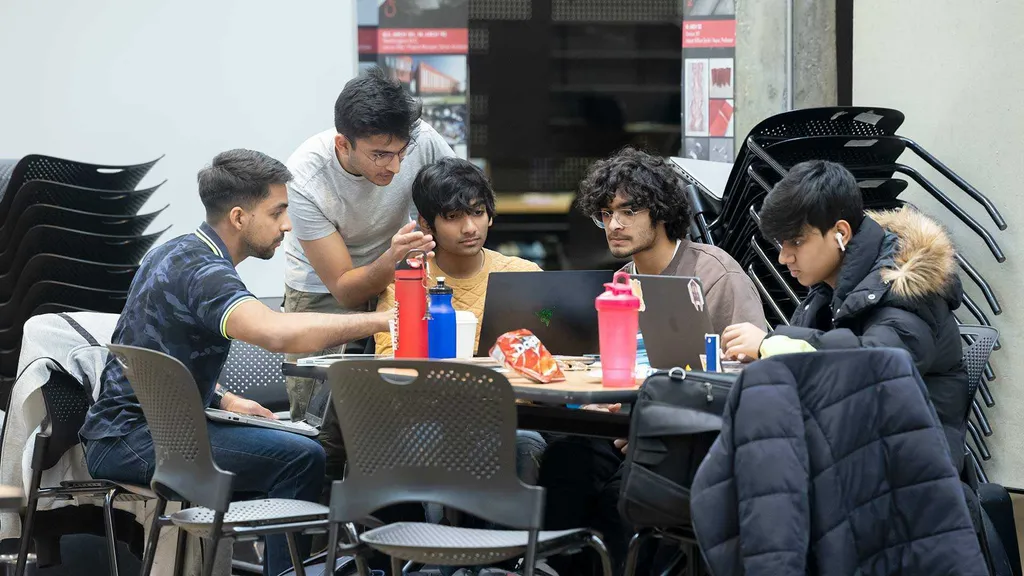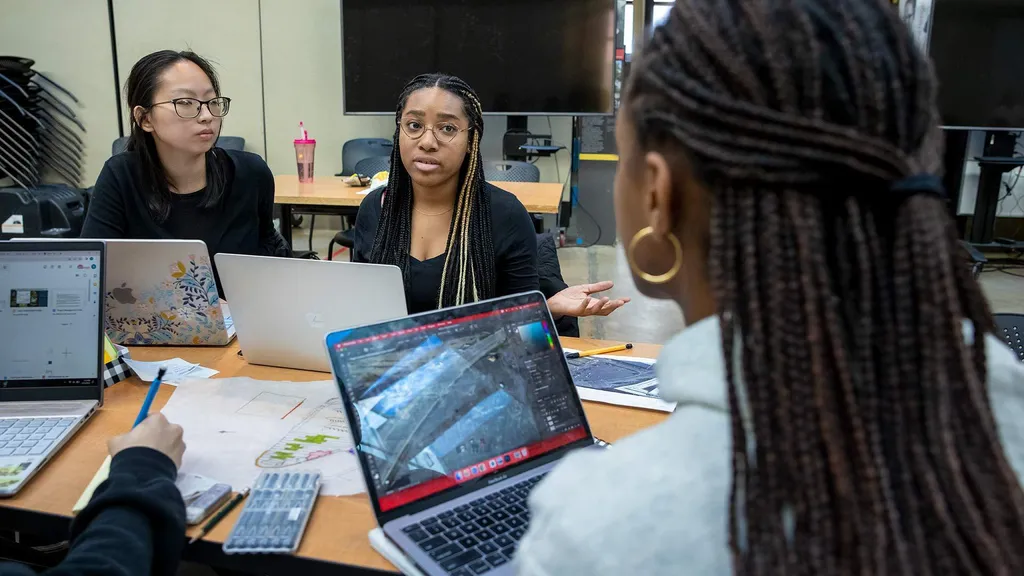- February 13, 2023
- By Maggie Haslam
Excitement may be coming sooner than expected to the future site of a major development in Greater College Park, no construction crews required: outdoor movie nights, crisp fall farmers markets and a temporary ice rink under twinkling lights.
The vision for the metamorphosis of an unassuming parking lot adjacent to the College Park Airport—and the future home of the Discovery District’s Aviation Landing—took off with judges at the University of Maryland’s second annual PlaceHack, earning four undergraduate students $2,500, bragging rights and possibly a new weekend destination. The group was one of three to nab a portion of $5,000 in prize money on Saturday night to close the 24-hour hackathon dedicated to imagining great campus spaces.
Sponsored by Terrapin Development Company, the university’s economic development arm, and the School of Architecture, Planning and Preservation (MAPP), PlaceHack challenged teams of undergraduate students to reimagine an underused place in College Park as an engaging, inclusive community asset.
“We gave you a challenging, busy site with high traffic and airplane noise and asked you to make it something special,” said Dawn Jourdan, dean of the school, to students at the final presentations. “And you did. I didn’t see anything today that I wouldn’t want to visit.”
The winning projects’ rotating series of engaging activities and temporary infusions of art and amenities aimed to connect a growing community and serve as a placeholder for a transit-friendly development of housing, restaurants and other businesses. Aviation Landing is the latest project in the $2 billion Greater College Park initiative to boost the area’s economic development and solidify its reputation as a vibrant college town.
[Mixed-Use Development to Take Flight Near Airport]
Aviation Landing could break ground as early as 2024. Until then, said Terrapin Development Company Vice President Tom Parker ’09, M.RED ’17, temporary “activation” of the site will build excitement around the upcoming development, create a sense of arrival from people disembarking the College Park Metro Station and add engaging functionality. This strategy, called tactical urbanism, creates temporary and experimental public spaces—like street murals, temporary bike lanes or a pop-up park—in advance of a longer-term project.
“Aviation Landing will be an extension of the university—and it wouldn’t be a university without students,” he said. “They bring lots of energy and ideas to their solutions, so we knew we’d get some terrific concepts from this competition.”

Fueled by pizza and Red Bull, a dozen teams strategized until the sun rose in the Architecture Building’s Great Space, consulting case studies and site maps of the 2.6-acre parking lot and surrounding area. Faculty, campus administrators and alums volunteered to counsel teams on accommodating the weekday commuter parking, programming for different seasons and contending with the area’s buzzing traffic.
Armed with AI imagery, models and QR codes, teams presented whimsical and meaningful transformations to the jury, from a “cargo district” of repurposed shipping containers featuring local businesses, to a satellite arts venue for live music and drive-in movies. Splashes of vegetation and paint—in the form of large murals and lattice fencing—tickled the senses while amenities like a walk-in lending library and holiday market created a place where students, nearby residents and visitors can come together.
“Decades ago, a developer would just put up a sign that said, ‘Coming soon,’ but this is creating an experience,” said mentor Bill Mallari, former assistant director of campus development. “The students showed that you can bring life to an impermeable parking lot both creatively and inexpensively, but also pointed to where larger, more permanent investments could be made.”

Now in its second year, PlaceHack was conceived by Jourdan to unite students after the pandemic and introduce concepts of making, preserving and celebrating meaningful places. The competition is part of the university’s Arts for All Initiative, which develops new and reimagined offerings to spark dialogue, understanding, problem solving and action. Student teams must be undergraduate and interdisciplinary: majors range from physics and computer science to architecture and history; several students who participated last year returned this weekend to vie for top prize.
Emerging from the Architecture Auditorium like exhausted passengers off a red-eye, the students were still flying high from the thrill of the competition.
“I just took a leap of faith,” said Kelly Tran '24, a business major who teamed up with friends in computer science and information science to take first place. “I’ve never had an opportunity like this before, and I’m so happy I did it. I know there are a lot of competitions in the business school that I’ve never tried, but I think I will now that I’ve had this experience.”
